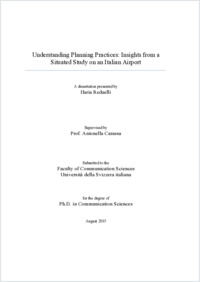Understanding planning practices : insights from a situated study on an Italian airport
- Redaelli, Ilaria
- Carassa, Antonella (Degree supervisor)
-
18.11.2015
287 p.
Thèse de doctorat: Università della Svizzera italiana, 2015 (jury note: Summa cum laude)
Anticipation
artifacts
computer supported cooperative work
coordination
ethnography
ethnomethodology
instructed action
membership categorization analysis
plan
planning
temporal coordination
social interaction
unexpected
English
This research projects examines planning as an instance of instructed action - that is, by focusing on how plans are designed and changed to anticipate actions, by competently using the instructions that regulate work. It does so by drawing on ethnomethodology and membership categorization analysis to understand the empirical materials collected over the course of ethnomethodologically informed ethnography in an airport center for the handling activities coordination. By focusing on plans, this research aims to foster understanding of cooperative dynamics in workplace settings. By approaching the study of plans as instructed actions, this research makes a new and original contribution to the understanding of plan use and planning as coordinative tool, and so unveils previously unnoticed aspects of plan use. In fact, it explains plans as artifacts that make it possible to maintain a consistent relationship between planning instructions and lived events, and to therefore link local and more transcendental aspects of work, such as the need to face patterns of organizational failure and maintain temporal coordination. This, in turn, has made it possible to challenge preconceptions in the study of plans. Indeed, by comparing the operators' practices for the competent setup and change of plans with literature on temporal coordination, it was possible to contradict current understanding of the role of plans in temporal coordination, which acknowledges that plans are difficult to use as temporal coordination devices. Moreover by comparing data analysis with the literature on organizations' capability to face the unexpected it was possible to challenge the received understanding of plans put forward by the mainstream theories on this topic, which recognize that plans and planning are not suitable for managing the unexpected or that they might even threaten the organizations' capability to face the unexpected. In addition, inspired by understanding anticipation as an embodied accomplishment forwarded by the concept of instructed actions, it was possible to engage with the understanding of the capability of plans to anticipate events as a distributed, artifact-mediated and dynamic accomplishment and, as a consequence, to challenge the received understanding of plans as artifacts whose capacity to anticipate future ways of performing activities is an immutable feature. Last but not least coupling the understanding of planning as an instance of instructed actions with the analysis of planners' interactions in light of the conceptual apparatus provided by membership categorization analysis has made it possible to go into the study of planners' interactions to explain re- planning as the effort to meet the outcomes of instructions with the local contingencies of work and to show how decisions about changes in the information content of the plans are made. In studying plans as instructed actions this study seeks to guide research on planning towards a more extensive understanding of plans as the outcome of the 'tendentious use of instructions'.
- Language
-
- English
- Classification
- Social sciences
- License
-
License undefined
- Identifiers
-
- RERO DOC 257755
- URN urn:nbn:ch:rero-006-114760
- ARK ark:/12658/srd1318552
- Persistent URL
- https://n2t.net/ark:/12658/srd1318552
Statistics
Document views: 318
File downloads:
- Texte intégral: 210
